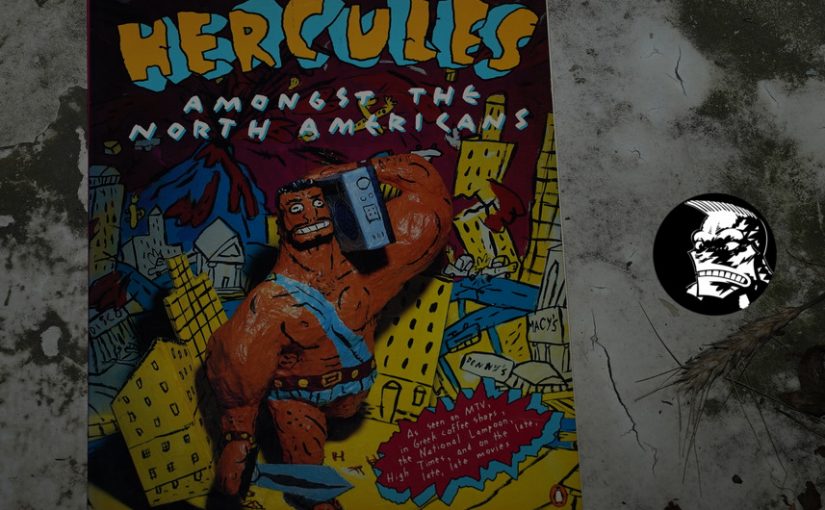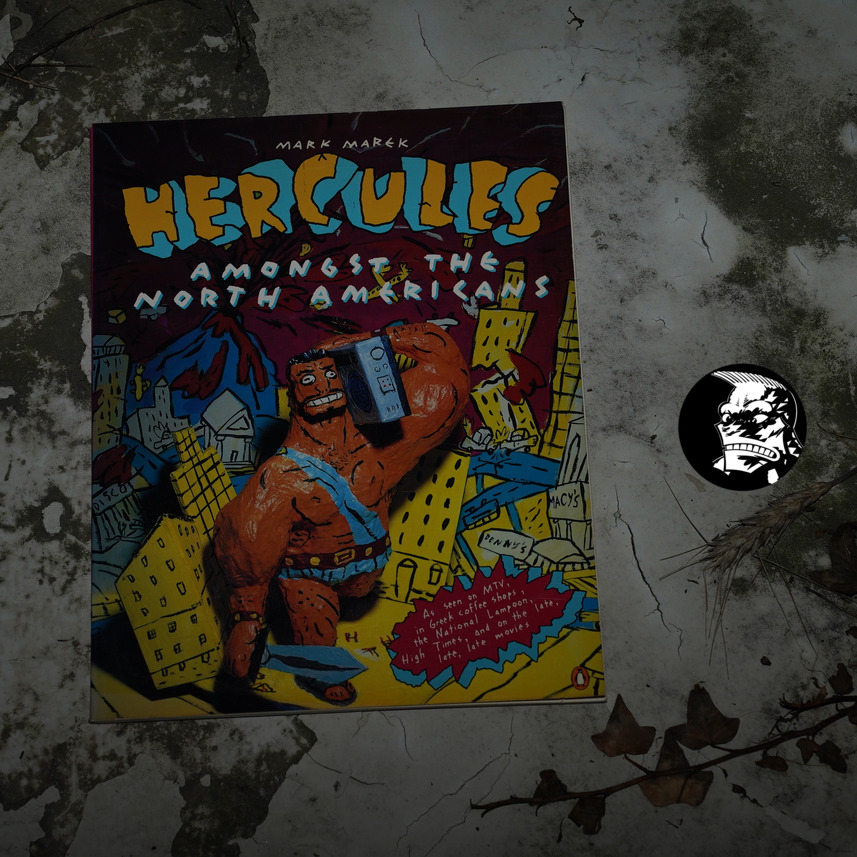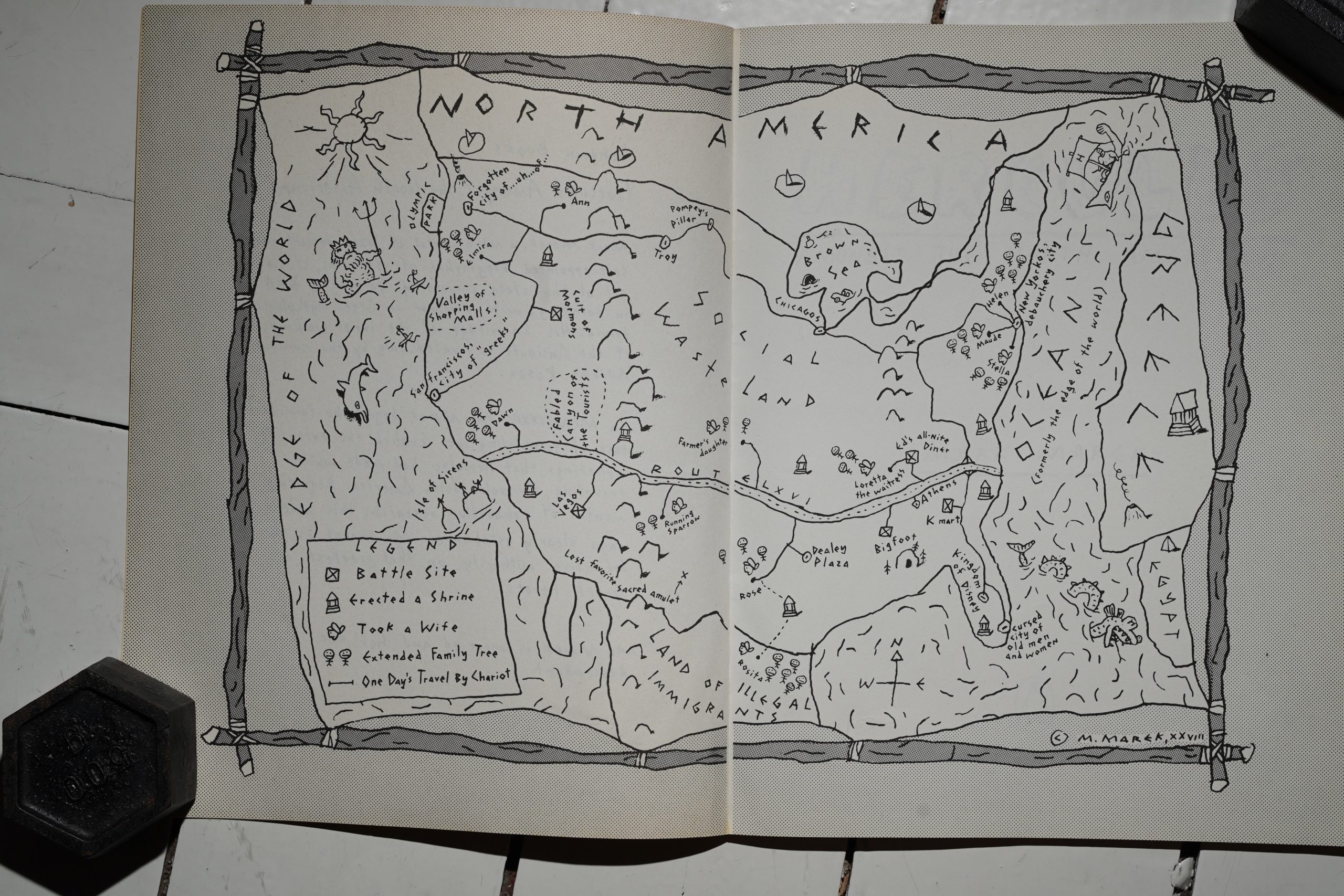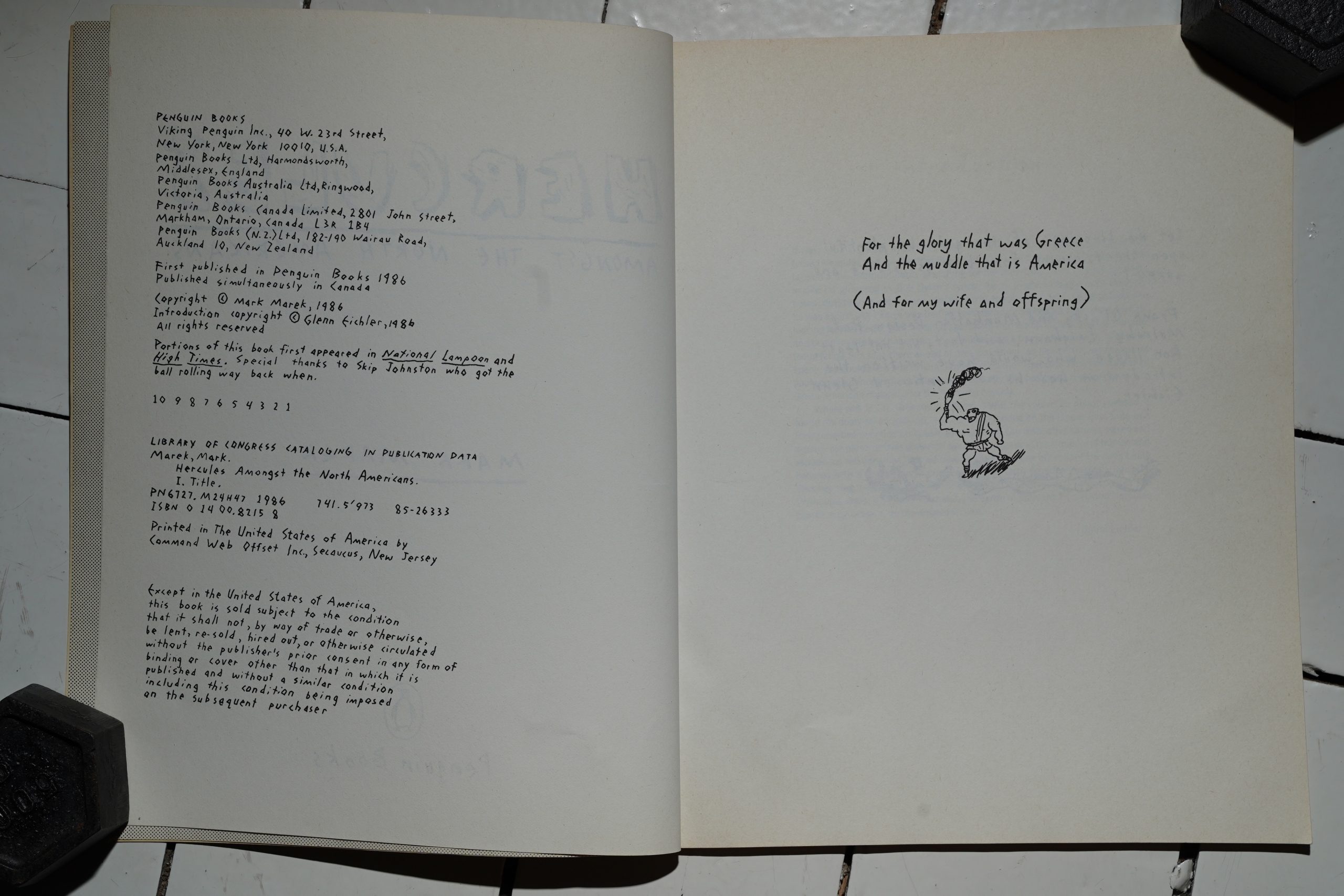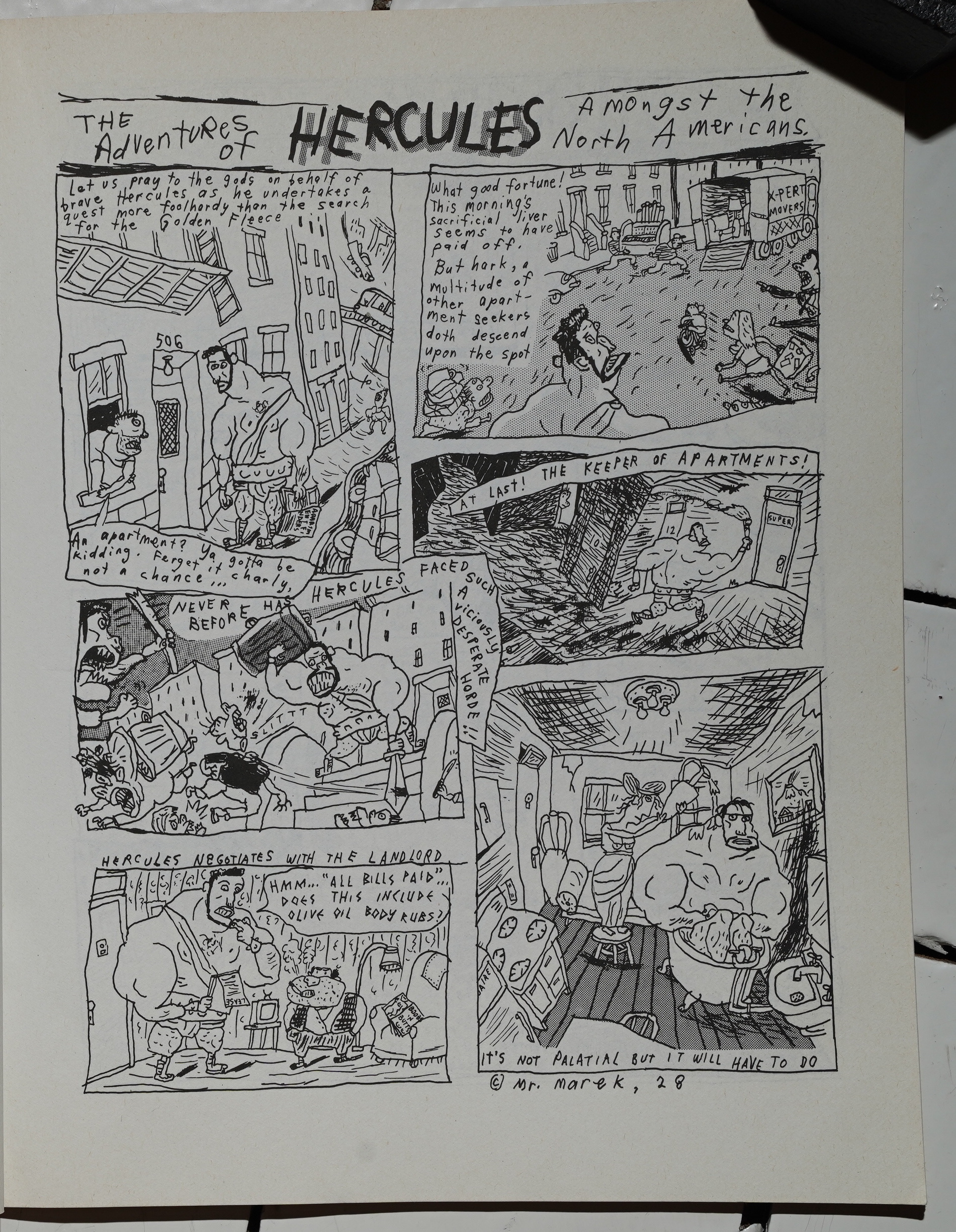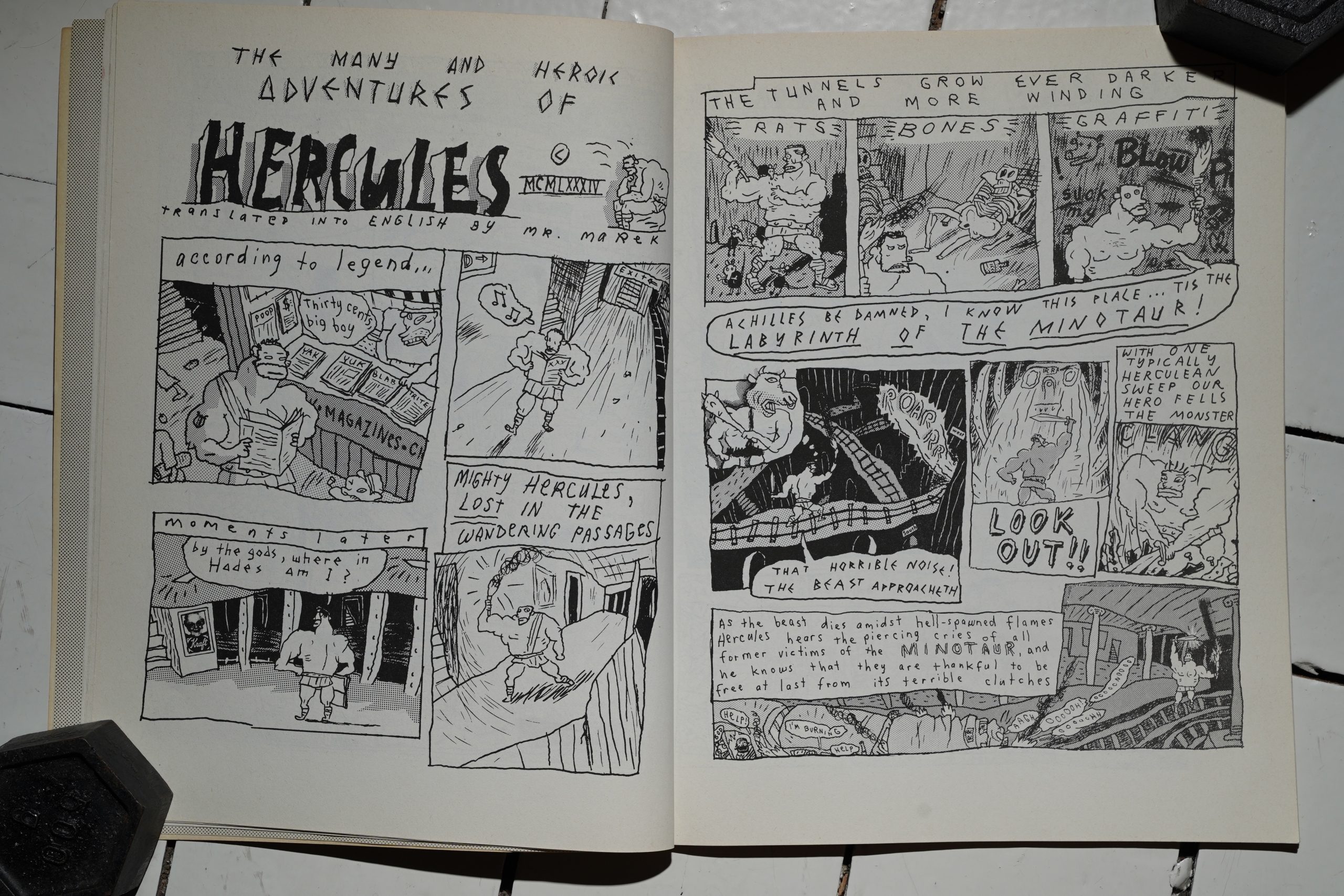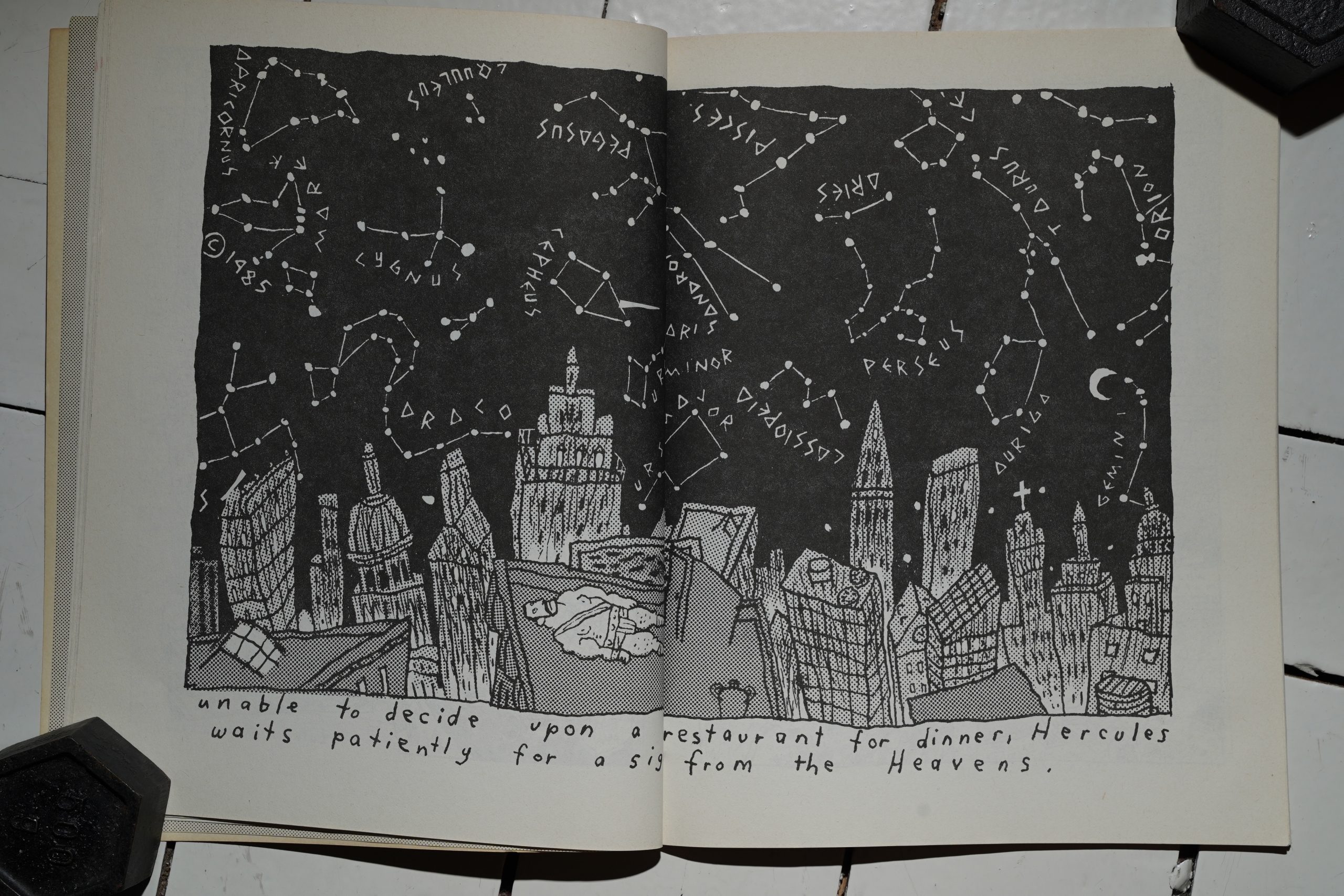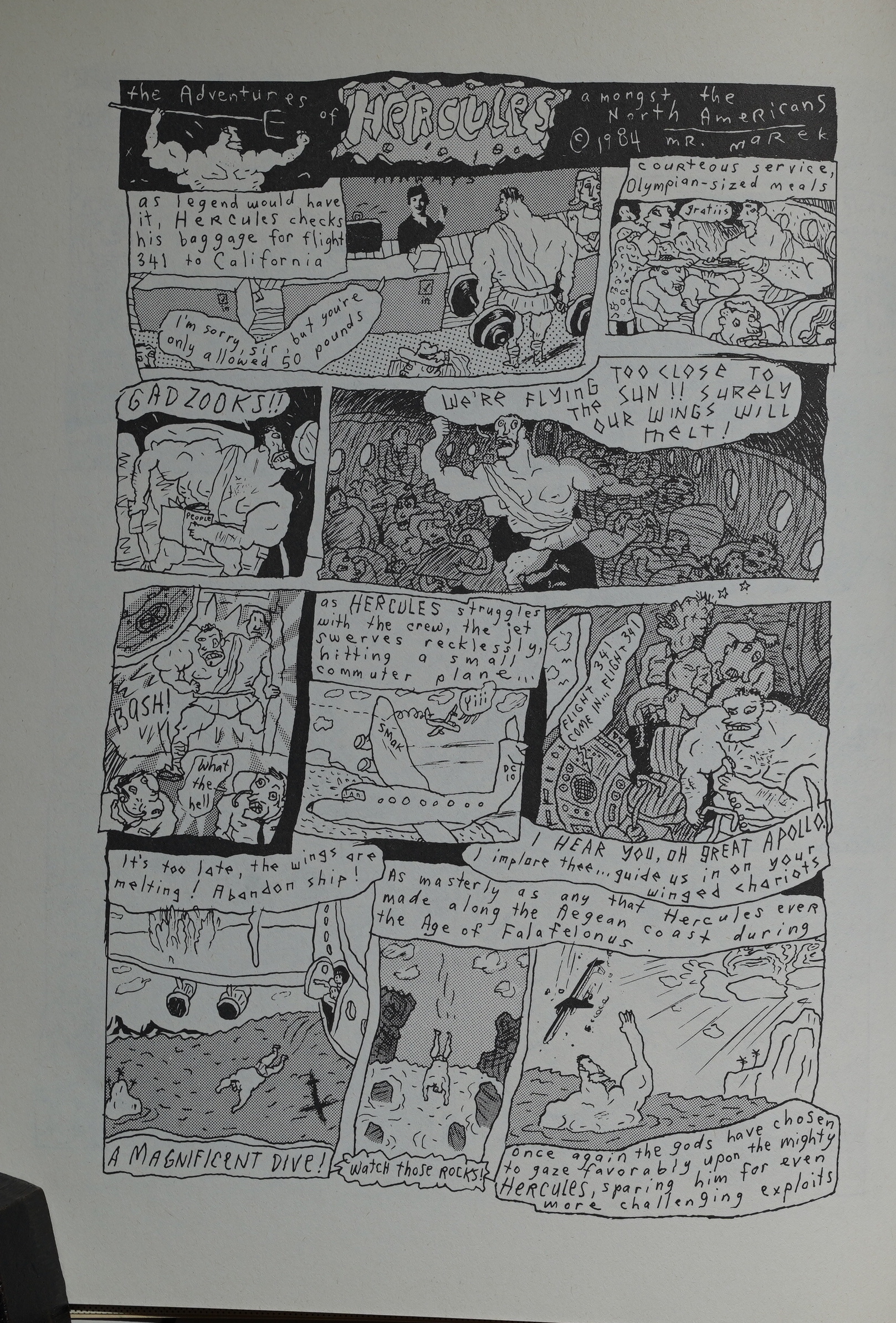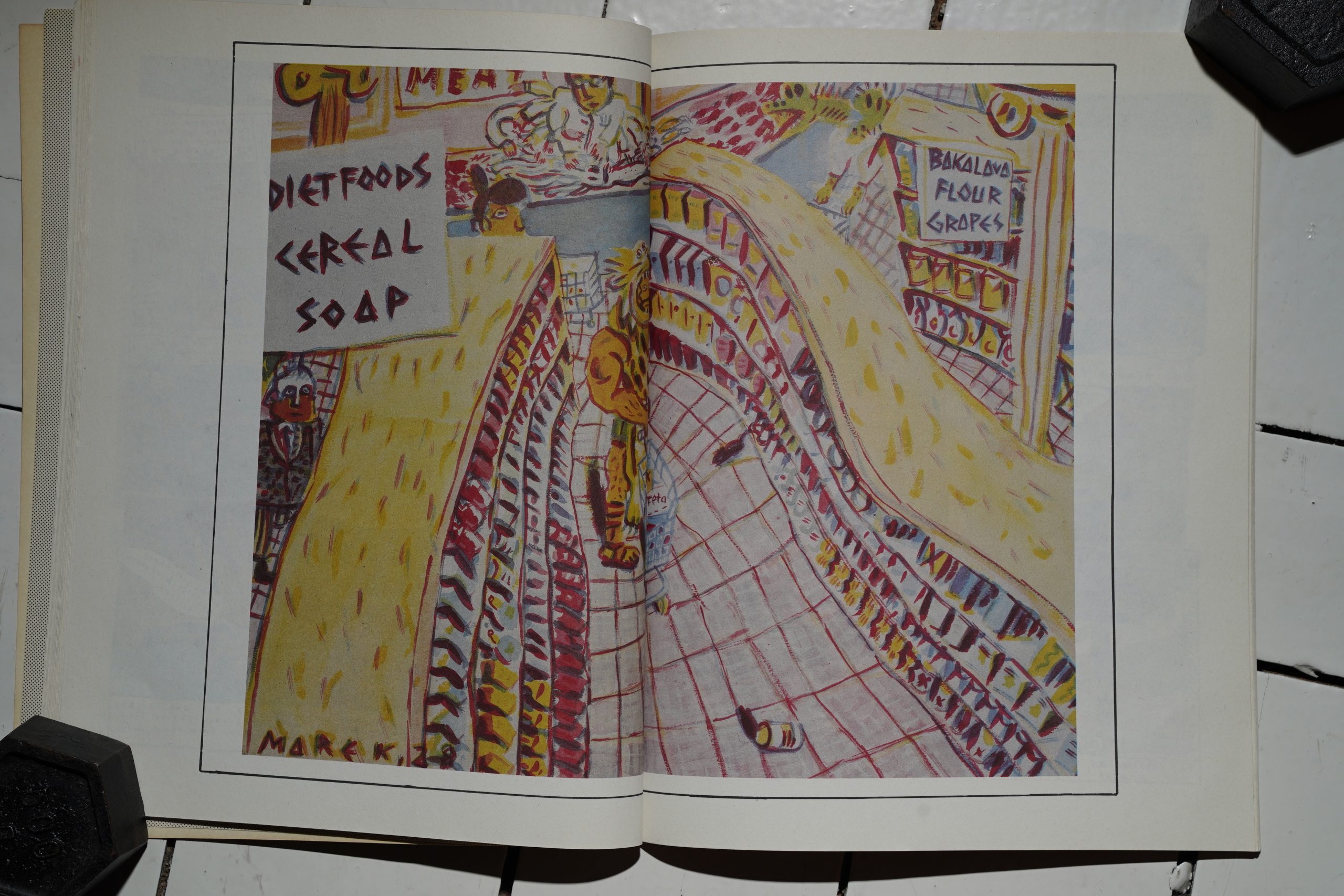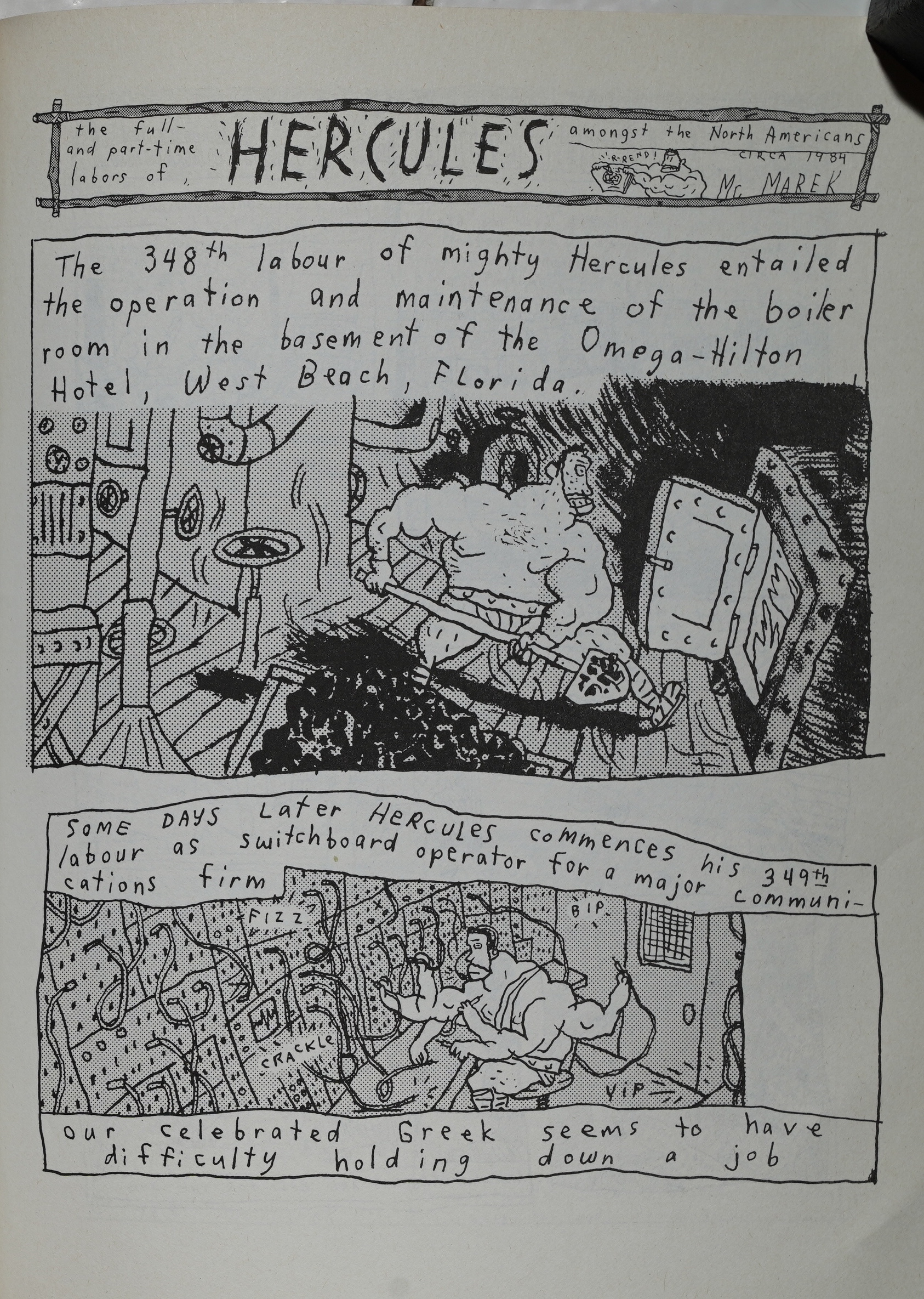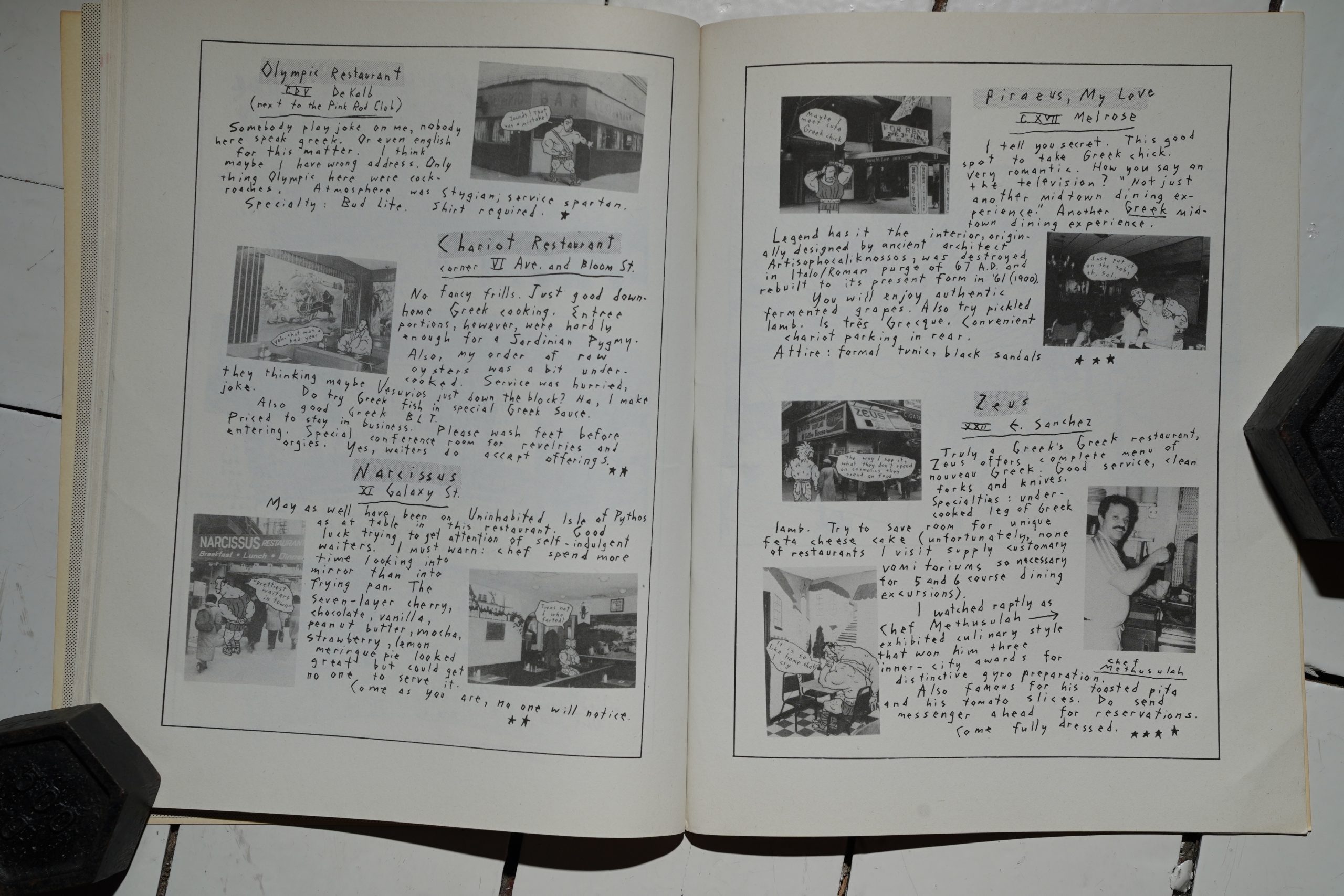Hercules Amongst the North Americans by Mark Marek (218x279mm)
Marek’s previous book was published by a New York design firm… but now “new wave” comics is starting to become a thing, commercially, so Penguin dips their toes into the waters with this book.
Wow. That’s the most accurate map of the US ever.
I like the design of this book — it’s very unpretentious. Marek letters (almost) everything himself, down to the indicia, and it’s printed on thin, off-white paper. Not quite newsprint, though.
These strips originally appeared in The National Lampoon and/or High Times, and the vast majority are one or two pages long, and have a sort of punchline. The central gag — Hercules living in the US now — is open to an almost endless number of variations, and Marek doesn’t repeat himself at all over these pages.
Some of these strips seem to be reproduced more enlarged than others…
We’ve all been there.
These are very funny strips, and I love how clear Marek’s storytelling is, even if the pages initially look like total chaos. It’s a neat trick.
I wonder whether this was initially meant to be saddle-stitched instead of squarebound: If I counted correctly, this spread is in the middle of the book, and it would have been perfect there as a two-page spread. With a squarebound book, the middle of the painting disappears, and it’s all rather disappointing.
But Penguin doesn’t publish spine-less books, so I dunno.
I mean, these are gag comics, but there’s an underlying pathos and melancholy on these pages… Even if there’s no “plot progression” to discern in the book, it feels emotionally coherent, and it reads like a cohesive book anyway.
And then we end with some pages of reviews of Greek restaurants. As one does.
Dale Luciano writes in The Comics Journal #110, page 70:
[…]
If Pekar makes a significant contribution
to the medium by means of the superbly
rnanaged naturalist approach, Mark Marek
brings a wholly different sensibility to Her-
cules Amongst The North Americans. Gary
Panter once described his own work as a
form of “protest against seamless illusion,”
a sharp break from conventional forms Of
comic representation toward an idiom that
values spontaneity, idiosyncrasy, even the
“rattiness” which is part of an unpolished,
untutored style. Mark Marek has a visual
style—it’s a primitive, scrawly mode, a
child’s goofy, silly way Of looking at reality
—but it is a style. The fact that Marek has
found an audience in National Lampoon and
now see+ his work gathered in this slick
Penguin volume seems evidence that the
impact and influence of Matt Groening,
Lynda Barry, and Gary Panter ‘has been
absorbed into a specific subculture of artists
and readers that is large enough (or grow-
ing large enough) to sustain the commer-
Cial hopes Of a major publishing house like
Penguin for this volume.
The stories in Hercu!es The North
Americans are hioek-faéetious in the terribly
hip, self-amused manner of an artist who
revels, Zippy-like, in the inanities and absur-
dities of Arnerigan culture. rvlarek’s basis for
humor is the intongruity of the classic
Greek hero-god (Hercules) being plunked,
uninitiated and at a hopeless disadvantage,
into the middle Of middle-class American
culture. Marek is mostly interested in wring-
ing “dumb humor” from that incongruity.
By “dumb humor,” I mean humor that is,
to a large extent, calculatedly stupid; it’s a
carefully worked-out clunkiness. The inten-
tionality behind the monumental inanity of
the strips testifies to a hip sophistication on
the part Of the creator—but you do have
wondering whether a gifted, semilunatic kid
on a cartoon rampage could have created
most of these strips. There are episodes with
Hercules wreaking havoc in a “Midas”
muffler shop, mistaking a giant Bullwinkle
balloon in the Macy’s parade for a Trojan
horse- like treachery—that last is my favorite
strip—slaughtering football players (whom
he mistakes for gladiators), etc. The satirical
overtones are implicit rather than formu-
lated: the concept Of Hercules is lampooned
(and diminished) by the action, as the
American pop culture machine diminishes
and devalues anything that is fed into it.
And’ it’s all presented as a child’s slapstick
spectacle.
Like Panter, Marek approaches comix
from a painterly perspective That might not
seem obvious until, making your way
through Hercules, you encounter an epic
IX)rtrait Of Hercules tied to the masts Of a
Texonn ship making its way through a
blustering, -storm-tossed sea. It’s broad,
punk-style, kitchen-sink lampooning, but
the composition, control of color, and the
boldness Of the execution in that single
image are excitingly managed. I found the
pure experience Of the painterly’ vision
here more viscerally powerful than anything
else. in the book.
I’m not without a measure Of respect for
the Jarry/schoolboy-jokester mentality
behind such arts of comic dada, but I con-
fess to finding the strips, intended as a
“lark,” cramped, adolescent, and tiresome.
Hercules Amongst the North Americans
intrigues me more for what it represents as
a marketable commodity than for what it is.
Dude.
This book has never been reprinted, which is darn strange. I can’t find any copies for sale on ebay, either (I’ve had my copy since the 90s).
It looks like it’s a sought-after item? That’s a ridiculously high price, I would have thought: I mean, it’s a Penguin book, so surely there has to be tens of thousands of these in circulation?
Mark Marek hasn’t done a lot of comics after this, and is mostly known for the cartooning work. But as this reddit thread points out, beware if you’re googling his name: There’s also a different Mark Marek that runs a gore site, and you don’t want to go there.
It seems like many people are rather ambivalent about the book:
Marek’s artistic approach can best be described as “hurried.” His ratty, meandering line recalls both Gary Panter and Lynda Barry, maybe a touch of Nicole Hollander as well. It’s deliberately ugly, and yet it kind of works. It feels like something scribbled on a napkin between bites of souvlaki, but there’s an urgency and sincerity to it that’s actually kind of appealing.
This is a f^&*ing funny book. It’s also incredibly rare these days. If you’re lucky enough to get your hands on a copy, grab it!
This blog post is part of the Punk Comix series.
